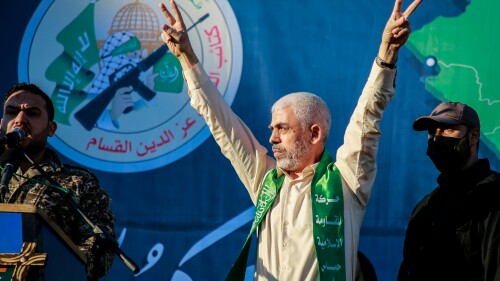The United States announced Thursday that Iran would not be able to access $6 billion that had previously been provided to it in the context of a prisoner swap between the two countries.
This decision is underscored by concerns like those expressed by Jonathan Schanzer of the Foundation for Defense of Democracies: “The United States is providing Israel’s greatest adversary with billions in sanction relief while making major nuclear concessions ... [it] amounts to a ransom payment that will fund the terror-sponsoring regime’s malign activities across the Middle East.”
Billions in sanctions relief for Israel’s greatest adversary is a ransom payment for terror funding.
U.S. Treasury Secretary Janet Yellen said Wednesday that the U.S. may place additional sanctions on Iran in response to Hamas’ genocidal assault on Israel on Oct. 7.
These are welcome developments. Iran is the chief sponsor of terrorism and chaos in the Middle East, supporting Hezbollah in Lebanon; various Palestinian terrorist groups, including Hamas; the butcher Bashar al-Assad in Syria; the ferociously anti-Israel, antisemitic, and anti-American Houthis in Yemen (slogan: “God is the Greatest, Death to America, Death to Israel, Cursed be the Jews, Victory to Islam”); and barbaric militias in Iraq.
Iran is also supporting Russia in its savage war against Ukraine.
Iran has reveled in the atrocities that its Palestinian proxy committed. One of Supreme Leader Ali Khamenei’s senior advisors, Yahya Rahim Safavi, called it a “proud operation.”
Iran’s Foreign Ministry spokesman also praised the attacks: “The resistance has so far achieved brilliant victories during this operation, and this is a bright spot in the history of the Palestinian people’s struggle against the Zionists.”
The State Department reported in 2020 that Iran provides up to $100 million a year in support to Palestinian terrorist groups, including Hamas. Ismail Haniyeh, Hamas’ leader who lives in luxury in Doha, Qatar, said in 2022 that Hamas received $70 million in military assistance from Iran for the year.
Iran has reveled in the atrocities that its Palestinian proxy committed. One of Supreme Leader Ali Khamenei’s senior advisors, Yahya Rahim Safavi, called it a “proud operation.”
Hamas terrorists deported by Israel to Lebanon in 1992 received training from Iran and Hezbollah. Shortly thereafter, Iran began sending Hamas $50 million annually, and Iran, Hezbollah and Hamas cooperated during the 2000-2005 Second Intifada.
Hamas members have been trained in Iran, and over the years, Iran has supplied its proxy with rockets and the knowhow to domestically make rockets. The only purpose of these rockets is to fire them into Israeli civilian centers.
Meanwhile, Hamas uses Gazans as human shields by purposely firing rockets from among civilians, knowing that any Israeli counterattack will lead to global outrage against Israel for killing civilians.
Israel has to ensure that something like the Oct. 7 invasion can never happen again. It has to re-establish deterrence to those who might wish it harm.
The U.S. can take specific measures as well. Given Iran’s unequivocal support for terrorist organizations like Hamas, the U.S. should intensify its punitive measures. Financial sanctions are only one element of a comprehensive approach needed to confront Iran’s malign activities.
The U.S. should lead a global effort to diplomatically isolate Iran by rallying allies to expel Iranian diplomats and restricting the international travel of Iranian officials. There should be a push to exclude Iran from international forums and negotiations until it ceases its support for terrorism.
The U.S. needs to engage in cyber operations to disrupt Iran’s ability to finance and communicate with terror groups.
An enhanced U.S. military presence in the region is crucial to deter Iranian aggression. The U.S. should regularly conduct military exercises with allies, upgrade missile defense systems, and showcase its readiness to defend U.S. interests and allies.
Furthermore, the U.S. needs to engage in cyber operations to disrupt Iran’s ability to finance and communicate with terror groups. Targeting the digital infrastructure that facilitates terror financing and operations will significantly impair Iran’s support to groups like Hamas.
Strengthening the defense capabilities of regional allies is also paramount. The U.S. should provide advanced military equipment and intelligence, enhance cooperation, and ensure that allies like Israel are prepared to counter and defend against Iranian aggression.
Expanded sanctions should target a wider array of individuals and entities within Iran, focusing specifically on those directly involved in supporting terrorism. A multilateral approach ensures that sanctions have broad and impactful effects.
The denial of $6 billion to Iran marks a significant step, but it must be part of a multifaceted strategy employing diplomatic, military and technological means to curb Iran’s support for terrorism. The U.S., standing firmly with Israel and its allies, should ensure Iran faces severe consequences for its malign activities in the region.








